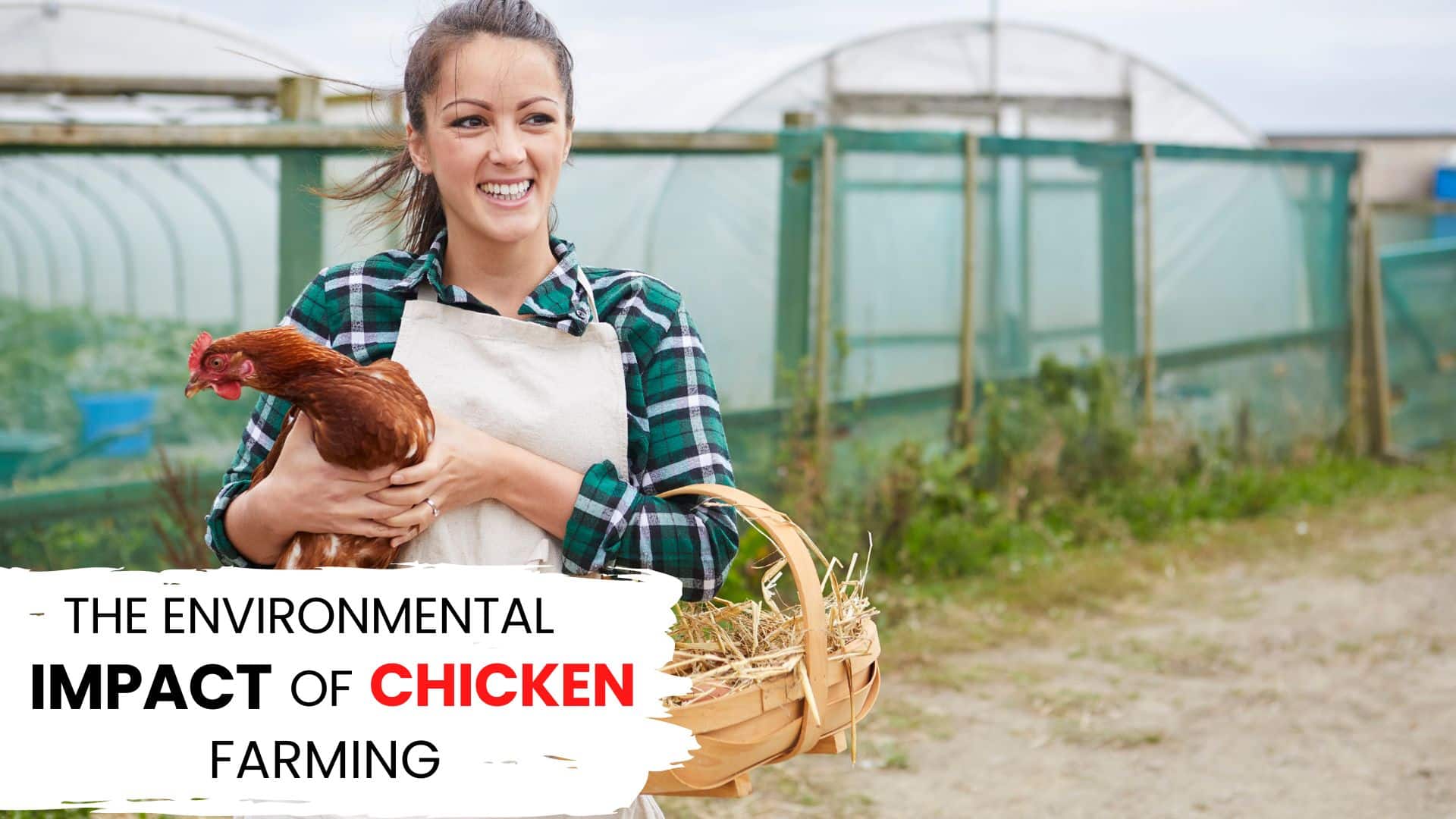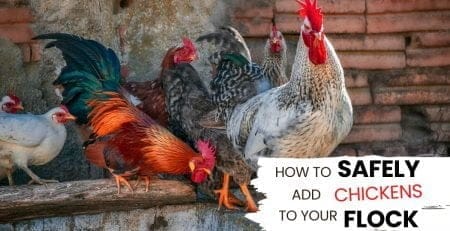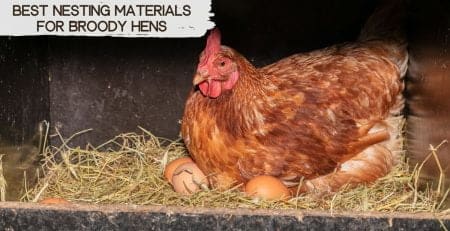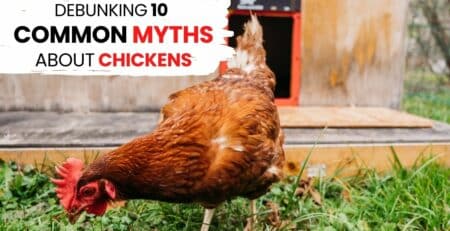Industrial chicken farming, otherwise known as factory chicken farming or large-scale chicken farming, is a prominent part of agricultural production worldwide. It’s a highly efficient and profitable industry that meets the rising demands for animal protein. According to the Food and Agriculture Organization (FAO), as of 2019, approximately 23 billion chickens are kept globally, of which around 80% are reared for meat production while the remaining 20% are raised for egg production.
Industrial chicken farming has become a major part of modern agriculture, but with its growth, various concerns have been raised regarding its impact on the environment. The massive number of chickens being raised in these factories results in a significant amount of waste, land use, and energy consumption, all major contributors to environmental damage.
Keeping backyard chickens can greatly reduce the need for these factory chicken farms, which in turn can help reverse some of their harmful environmental impacts. This article discusses the environmental impact of large-scale chicken farming and explores how keeping your own backyard chickens can help to lower some of these damaging impacts in your own community.
Effects of Industrial Chicken Farms
Waste Management
One of the most significant environmental issues facing industrial chicken farming is waste management. Here are a few things you should know about waste management on industrial chicken farms.
- Millions of chickens are raised in factory farms, which results in an enormous amount of waste production. Types of waste generated on an industrial farm include manure, feathers, and bedding material that needs to be properly handled.
- Chickens generate approximately 5 to 6 lbs. of manure per bird every year. In large-scale poultry farms, the accumulation of waste can cause environmental issues such as soil and water pollution, air pollution, and greenhouse gas emissions.
- The waste generated in industrial chicken farms is usually stored in large manure pits, which produce harmful gases and pollute the air, soil, and nearby water bodies.
- The waste from these farms is also a significant cause of water pollution. The toxins contained in the waste can get into water bodies nearby, leading to the death of aquatic life, algal blooms, and various other harmful effects.
- The nitrogen, phosphorus, and other chemicals present in chicken manure can also cause eutrophication, which is a process where these nutrients lead to excessive growth of algae and other aquatic plants, resulting in oxygen depletion and the suffocation of aquatic organisms.
- Proper manure management is critical for protecting the environment from pollution. Traditional methods of manure disposal (such as spreading on fields or dumping into waterways) are not appropriate in large amounts and can lead to several environmental problems.
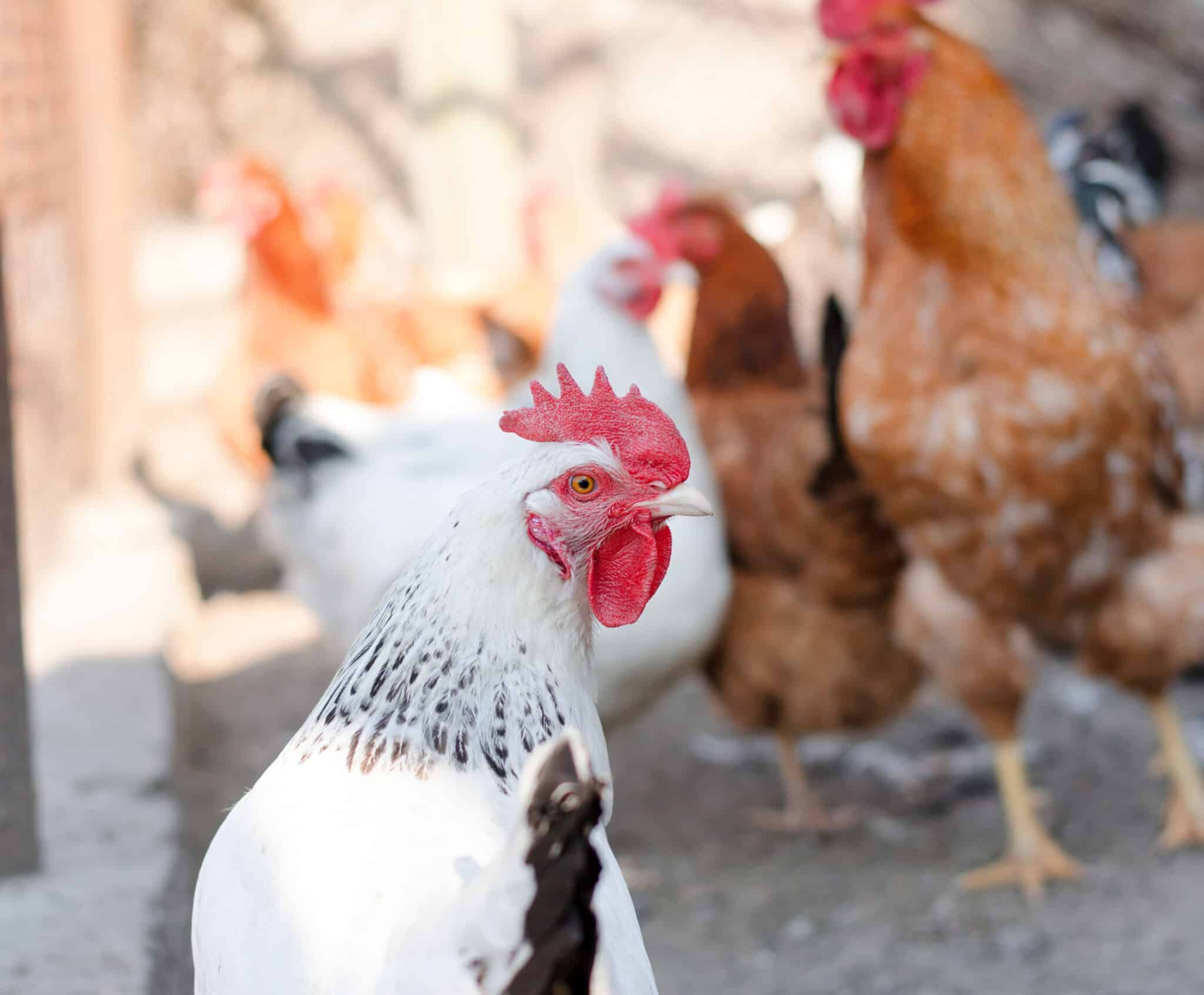
Land Use
Another major issue caused by industrial chicken farming is the increased land use. Factory farms require a lot of land to be used for infrastructure, including buildings, access roads, and storage facilities.
The land used for chicken farming includes not only the space for the chickens to live but also the land used for growing the feed upon which they are raised. Land used for the production of feed is the most significant part of the land used for chicken farming. According to the FAO, approximately one-third of the global arable land is devoted to growing feed for livestock.
Furthermore, as the number of chickens continues to grow, more land is needed to raise them and to grow feed crops such as corn and soybeans, which are used as chicken feed. This increased land use can lead to deforestation and habitat destruction, leading to a loss of biodiversity and an increased risk of natural disasters such as soil erosion and flooding.
The impact of land use can lead to several environmental issues, such as soil degradation, deforestation, and biodiversity loss. The cultivation of crops for feed purposes in high amounts leads to loss of fertility in the soil, which can highly reduce the quality of the soil. This can make it vulnerable to erosion and thereby reduce its ability to sequester carbon.
To reduce the environmental impact of chicken farming on land use, sustainable production practices are crucial. These practices include the use of regenerative agriculture, such as no-till farming and cover cropping, and the use of sustainable feed sources such as plant-based protein sources.
Energy Consumption
The energy required to keep industrial chicken farms running is another significant factor affecting the environment. Huge amounts of energy and resources are used to power the facilities, run the water systems, provide ventilation, and generally keep the farm operational.
These farms also require large amounts of energy to transport feed to and from the farms and to transport chickens to processing facilities. The energy required for heating, ventilation, and lighting in poultry houses is a significant part of the energy used in chicken farming.
The use of non-renewable energy sources such as coal and gas in the production of energy leads to the release of greenhouse gases, contributing to climate change. The energy consumption in chicken farming also contributes indirectly to climate change via the production of greenhouse gas emissions from the production of energy.
To reduce the environmental impact of chicken farming on energy consumption, alternative energy sources can be utilized in poultry operations. These alternative energy sources include solar and wind power, which are renewable and reduce greenhouse gas emissions.
Environmental Benefits of Raising Backyard Chickens
Backyard chicken farming, on the other hand, is a less-intensive approach to raising chickens for eggs and meat that offers several significant environmental benefits.
- Small-scale chicken farming is an efficient way of utilizing space in a sustainable manner. Unlike factory farms, raising backyard chickens does not require a significant amount of land.
- The chickens are not raised in large numbers, so the amount of waste produced is minimal. Waste produced on backyard chicken farms can be used as a fertilizer, providing a natural way of recycling nutrients back into the soil. This contributes to the overall health benefits of the land.
- Backyard chicken farming also offers a sustainable source of food as it eliminates the need for poultry to be transported over long distances. This, in turn, reduces the overall carbon footprint of the agricultural industry.
- The chickens can be fed with kitchen and garden scraps, which reduces the need for using feed crops–which in turn reduces deforestation.
- Backyard chicken farming also offers significant benefits for soil conservation. Chickens are known to have the unique ability to scratch and aerate the soil. This activity helps to discourage soil erosion and increases soil fertility by improving the soil structure, leading to better nutrient and water retention in the soil. As a result, the soil is healthier and the land can produce more crops per acre, leading to increased food production overall.
- Finally, backyard chicken farming also offers an excellent opportunity for locally produced food. By raising chickens in urban and suburban areas, individuals can take on a more significant role in producing their own food while reducing their carbon footprint. This approach to food production also provides healthier and fresher food options for consumers.
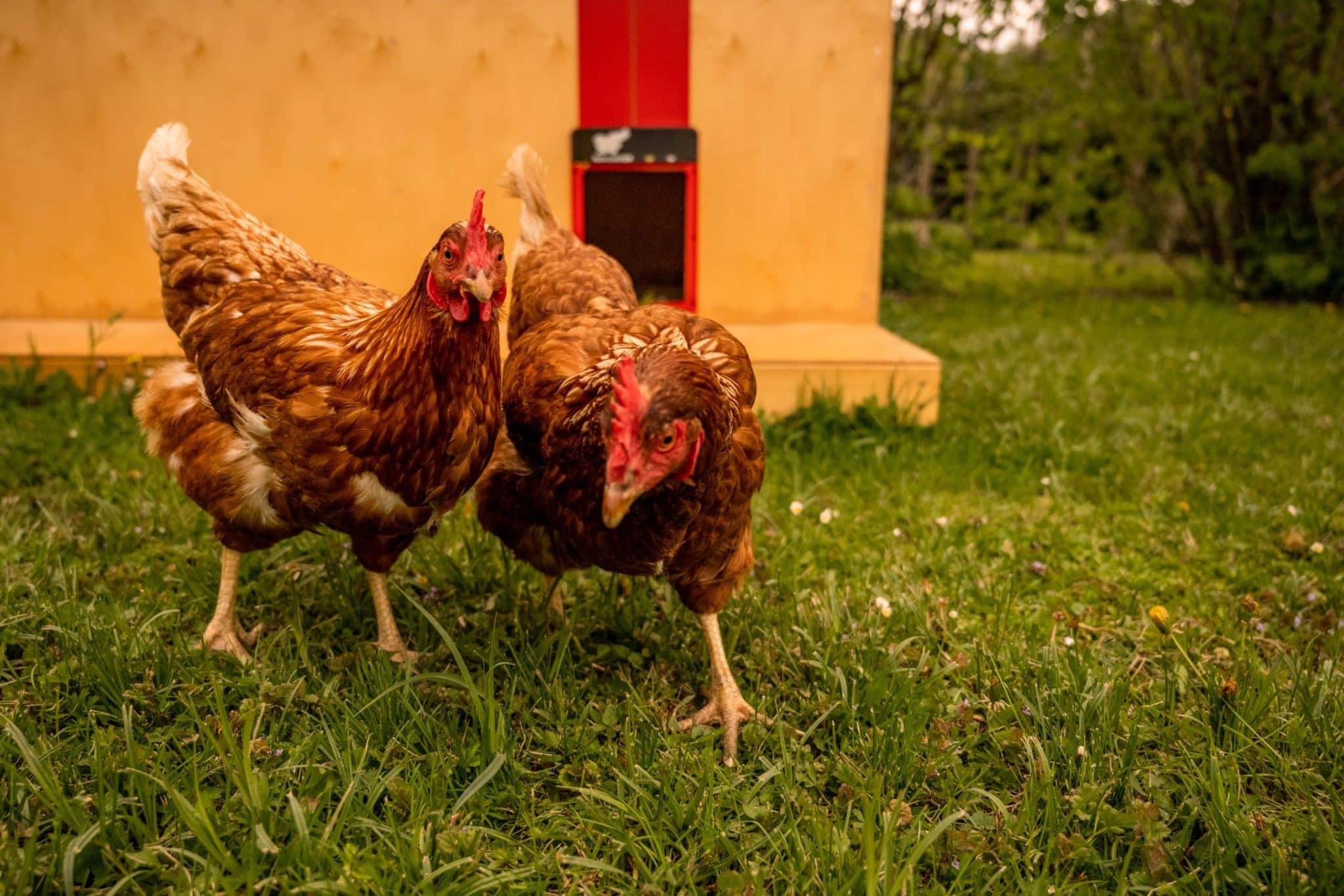
What Do You Need To Get Started Raising Chickens in Your Backyard?
Raising chickens in your backyard doesn’t have to be complicated. Chickens require minimal effort when it comes to taking care of them. The biggest obstacles include: ensuring they have enough space, proper food and water, and their coop is safe and secure from predators. We’ve made a short list of the basic things you’ll need to get started raising chickens in your backyard.
- Coop & Run
Chickens need a basic shelter, known as a coop, to sleep in at night and to keep them safe from predators and harsh weather. It should have roosts and space for nesting boxes. The chicken run should allow at least 10 square ft of space per bird if they’re not allowed to free-range.
- Automatic Chicken Coop Door & Heavy-Duty Fencing
When it comes to keeping your chickens safe, investing in an automatic chicken coop door from Run-Chicken is one of the best things you can do. These sturdy, durable automatic chicken coop doors will ensure your chickens are safe from predators all night long. Be sure to use heavy-duty fencing for an extra layer of protection.
- Feeders & Waterers
Chickens need access to fresh, clean water all day long, so investing in a large waterer is a good idea. Chickens that are allowed to free-range will scrounge up most of their food on their own, but they still need to be fed by you daily. Run-Chicken sells large, indoor chicken feeders that can hold 20 pounds of feed–which means you’ll spend less time feeding the chickens.
- Nesting Boxes
Hens don’t build nests to lay their eggs in, like many other species of bird. You’ll need to provide them with nesting boxes to lay their eggs in. You will need one nesting box for every 3 to 4 hens, so plan ahead accordingly. Nesting boxes from Run-Chicken are easy to mount on the wall, and they come in a unique honeycomb shape that your hens are sure to love.
Conclusion
Industrial chicken farming is a significant contributor to environmental degradation in today’s world. This form of agriculture requires vast amounts of land, energy, and water, which leads to soil depletion, water pollution, and habitat destruction. The waste produced by these farms also contributes to its negative impact on the environment.
On the contrary, backyard chicken farming is an environmentally friendly approach to chicken production that offers significant benefits such as improved soil health, energy efficiency, water conservation, and local food production. Therefore, it is imperative that we all support the transition from industrial chicken farming towards more sustainable and environmentally friendly practices such as backyard chicken farming.

